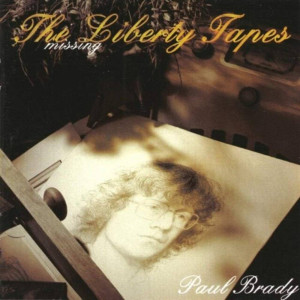 Judith Gennett wrote this review.
Judith Gennett wrote this review.
This is only in a limited sense a new album. The story goes that The Liberty Tapes were made of a legendary Paul Brady concert in 1978, using a domestic reel-to-reel and tape. Brady immediately misplaced the tapes, then, amazingly, unearthed them in 2000.
The legendary concert was put together to promote the release of Welcome Here Kind Stranger, Brady’s final traditional album. Included in the program were songs from that album and from a self-titled album he did with Andy Irvine. It’s not so much Brady’s ornamented (then contemporary) tenor vocals that make the concert worth publishing, although his voice was top-flight. Rather it is the star-studded back-up band he gathered at short notice for the concert: three guitar-bouzouki-mando boys — Irvine, Donal Lunny and Brady himself — plus Paddy Glackin on fiddle, Liam O’Flynn on pipes, Matt Malloy on flute, and Noel Hill on concertina; in effect an expanded nouveau Planxty.
Both the sound and the lineup send a cheerful shiver of deja vu up the spine of a veteran listener or player. Brady sings as he does on the old Green Linnet LPs that have by now been played over and over, and it’s that same crisp winning sound that won us over way back when. What a great opportunity to get a replacement recording without duplicating the library! The lineup is not that much different from that of Welcome Here Kind Stranger, which actually came out here in the US in 1985. But really, as an album The Liberty Tapes stands on its own as well. Magically, the sound quality is excellent, the mixing is good aside from a few times when the vocals dip, and the performances are great, though Brady misses a couple of notes.
So for those who boarded the Irish Sea ferry on its later stops, what is here? Most importantly, interesting traditional songs with classic themes, great for those who love the romances. The most striking is “The Creel,” which is about a girl who lets her boyfriend in at night; the mother goes to check out “a noise,” slips on the chamber pot, and… Andy Irvine introduces this one. “The Lakes Of Ponchartrain,” learnt from Christie Moore, tells about the traveler and a Creole girl. “If it were not for the alligators I’d sleep out in the woods.” It is a song taken from the Planxty LPs and recorded over and over by Irish bands small and large. In “Arthur MacBride,” two cousins tell the recruiting sergeant and his little wee drummer to go to hell, and Paul plays solo guitar, just as he does in Andy Irvine / Paul Brady. It’s been written that Planxty’s key was “putting rock rhythms to Irish music” without adding electricity. Perhaps, and perhaps Brady’s vocal trick was keeping the essence of the old ornamented vocals but adding the palatability of what today would be called “rock sensibilities,” to keep the music solid and relevant.
The backing instrumentals are heavily laden with the bouzouki and pipes. After “The Creel” is one of Irvine’s intricate Eastern bouzouki leads, apparently a new one, called “Out the Door and Over the Wall.” However, for the most part the bright complex bouzoukis and mandolins of Irvine or Donal Lunny or both back the vocals for an almost Appalachian flavor. To be sure, O’Flynn’s uilleann pipes appear on only two tracks, so perhaps it is the whistles, flutes, fiddle, and Irvine’s gurdy and harmonica that are mimicking its slow wavering whine. The major point of contemplating the backing band is to consider that folk instruments maintained the sense of the land and of non-commercialism, of history and tradition, but were played in a way sufficiently different and contemporary to ward off the evil spirits of the lives of irritating older relatives. Maybe it’s like Neil Young trying his hand with country music. In any event, it’s a pretty sound.
Enough of pseudo-ethnomusicology (I am Inclined To Ramble). Though the album lasts almost an hour, it seems irritatingly and unnecessarily short.
(Compass, 2002)
